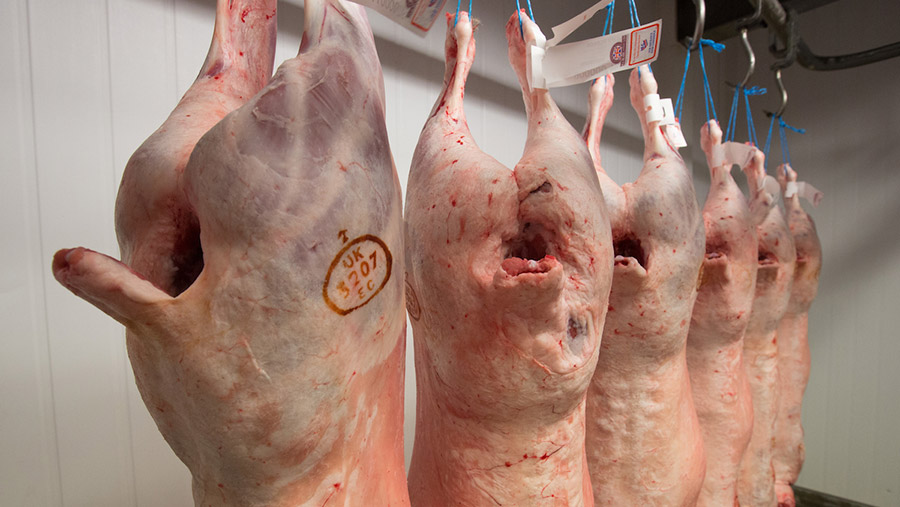Brexit: ‘Serious loss’ in meat export trade
 © Tim Scrivener
© Tim Scrivener A serious loss of export trade is being reported by UK meat processors as Brexit rules delay shipments to the EU.
The British Meat Processors Association (BMPA) said it was receiving a growing number of calls from meat companies highlighting a plethora of problems at the border.
See also: Vet checks and paperwork hit meat exports
These problems were causing a serious and sustained loss of trade with the UK’s biggest export partner, with fresh meat one of the most time-critical perishable products, it added.
The warning comes the day before food and farming representatives give evidence to Parliament on agri-food trade with the EU.
Processors have warned that the impact of delays and loss of trade will soon be felt at the farm gate if not rectified.
The BMPA said every hour delay to a lorry load of meat increases the risk of a shipment being reduced in price, cancelled and returned or – most severely – ending up in landfill.
Long delays
One company had reported on 11 January that it had six lorry loads of product worth about £300,000 waiting for customs clearance into the Republic of Ireland.
BMPA chief executive Nick Allen said: “At the time, one of those loads was about to be returned to the processing company after waiting five days for clearance.
“Drivers have been reporting long delays as they wait for HMRC to process the customs documents.”
BMPA is calling for the customs and certification system to be digitised, arguing that the existing paper-based system is a relic from the last century and simply not fit for purpose.
“It was never designed to cope with the kind of integrated, just-in-time supply chain we have built up over the past 40 years,” said Mr Allen.
“If not fixed quickly, it will be the thing that starts to dismantle the European trade British companies have fought so hard to win.”
Not ‘teething problems’
Mr Allen said he accepted that some issues were caused by unfamiliarity with the new system on both sides of the English Channel.
But he said the situation went beyond the “teething problems” described by foreign secretary Dominic Raab as companies adjusted to the new way of working.
Mr Allen said there were other serious structural problems too, which would not go away and would now form part of the “new norma” trading arrangements.
One example of how the system was failing UK companies was the issue of “groupage” – which sees small consignments of mixed products grouped into one big lorry load.
Until now, more than 40% of the British meat industry’s trade with the EU was sent this way, enabling processors to make daily deliveries of a smaller but wider range of stock.
Groupage was an essential part of the “just-in-time” supply chain, which meant EU customers could keep shelves stocked with high value, retail-packed goods.
‘Badly implemented’
“The new post-Brexit customs system for meat products is convoluted, archaic and badly implemented,” said Mr Allen.
“At best, it is causing delays to simple, single-product loads, but at worst, it has meant that grouped loads are now no longer viable to send.”
Some of the UK’s largest haulage firms have already ceased completely taking grouped loads.
“If continental supermarkets are unable to have products delivered the way they need them to be, this trade will simply be lost as EU customers abandon UK suppliers,” he said.
“Members are already being told by their EU customers that they’ll be looking to Spain and Ireland to buy product from now on.”
The government has urged agri-food exporters and hauliers to ensure they meet necessary requirements before taking shipments of perishable goods to the border.
Paperwork in order
Exporters must provide the right documentation to hauliers, including export declarations and the extra certificates needed for products like plant and animal products.
Relatively low levels of trade have been reported since Christmas and the New Year, but the volume of HGV traffic has since steadily increased to near normal.
Some 40,000 trucks each week are expected to France by the fourth week of January.
Cabinet Office minister Michael Gove said there could be significant disruption if traders and hauliers failed to comply with the new rules.
Exporters must provide the right documentation to hauliers – including export declarations and extra certificates for animal products, he said.
“We have always been clear there would be changes now that we are out of the customs union and single market, so full compliance with the new rules is vital to avoid disruption.”
